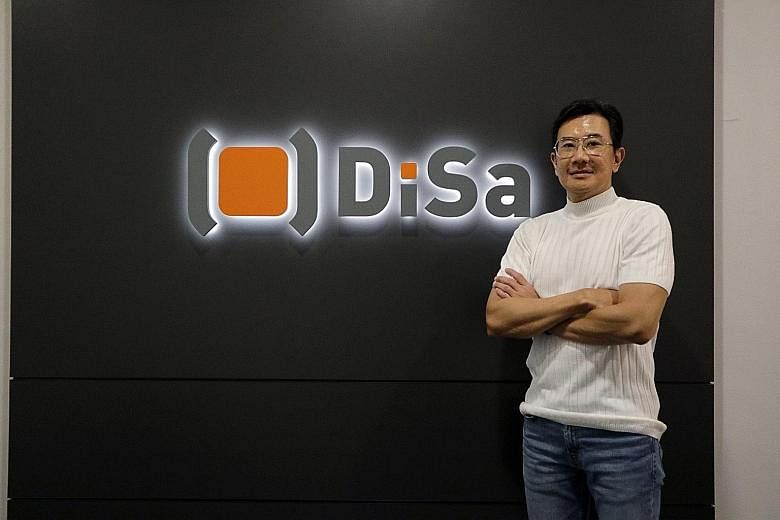Singapore-listed digital security firm DiSa was born from a germ of an idea in entrepreneur Eddie Chng's mind 10 years ago after seeing a thief in action in Germany.
"We had stopped by a supermarket to buy batteries," he recalled. "That was when I saw a man slip some SD cards into his winter jacket and walk out without paying."
A pithy comment then by a friend - "Shoplifting is rampant in Europe, and if anyone can solve this problem, it will be big business!" - lingered in Mr Chng's mind long after the incident.
"As an engineer, my inspiration has always been fixing a problem with a solution that no one has thought of yet," he said.
"So a year later... we came up with an anti-theft technology that makes electronic devices non-functional until they are activated by a PIN code at the point of purchase."
Getting retailers to adopt the technology proved to be an uphill battle.
Small stores in Germany were reluctant to pay, and after nearly two years, Mr Chng turned his attention to the United States.
DiSa charges manufacturers and suppliers for the technology, but to get manufacturers to sign on, the firm focused on reaching out to retailers as they stand to lose most from theft.
It took a year of pitching and another 12 months before the first proof-of-concept testing took place in September 2016. Finally, in May 2017, a retail giant implemented DiSa's point-of-sale activation solution in its 5,000 stores across the US for products ranging from tablets to digital cameras to TV sets.
"We believe that if we can secure the top five retailers in the US as clients, we will be able to set the standard for retail security in the country," said Mr Chng.
The technology also allows for better product placement in stores, as the items are not encumbered by physical locks, bulky cables or glass cabinets. "Stores that have implemented this open-sell experience effectively see a 20 per cent average sales lift," he added.
Mr Chng had faced several setbacks with business ventures two decades ago. In 2003, he emerged as a white knight for financially troubled garment retailer and property developer Heshe Holdings.
The company was later renamed Equation Summit and then DiSa, a name coined from the first two syllables of the word "digital safety".
Listed on SGX Catalist since 1992, it has a market capitalisation of about $20 million. Mr Chng was appointed managing director and chief executive in February 2005.
DiSa had a net loss of $17 million in the 12 months to June 30 last year.
The group's point-of-sale activation solution, which incorporates smart barcodes, protects a device from manufacturing through to point of sale, making it non-functional until purchased and activated.
Its sensors allow retailers to set alarms and display unpaid items, while a smart checkout system lets shoppers complete purchases by scanning products without having to remove items from the cart.
The firm has also introduced smart barcodes to food retailers, allowing both retailers and consumers to track expiry dates, production batches and ingredients so as to prevent food spoilage.
Last March, US organic produce supplier Bailey Produce tagged its bananas with smart barcode technology, which tracks each fruit bunch from farm to table.
Singapore telco M1 has also partnered with DiSa to roll out a warranty programme protecting phone users against cybertheft.
The firm plans to proliferate its technology across US retail stores.
"There are also high barriers of entry to this market and we have the first-mover advantage," said Mr Chng.
• This is an excerpt from Singapore Exchange's Kopi-C: The Company Brew, a column featuring C-level executives of SGX-listed firms. Previous editions are here.

